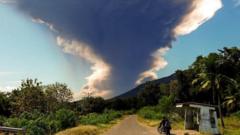This year's wildfire season in Manitoba is on track to surpass records set in 1994, with urgent evacuations and support from American firefighters.
Vast Wildfires Prompt Manitoba to Issue Distress Call Amid Record-Breaking Fire Season

Vast Wildfires Prompt Manitoba to Issue Distress Call Amid Record-Breaking Fire Season
Manitoba's emergency declaration comes as wildfires threaten communities, leaving thousands displaced.
In a drastic response to an intensifying wildfire crisis, the government of Manitoba declared a state of emergency as over 100 wildfires swept through the province on Friday, marking the most significant burning trend since 1994. Provincial officials reported that approximately 2.5 million acres had already been scorched this year, and conditions are deteriorating, with several fires classified as out of control.
Factors such as a heatwave this summer have exacerbated the state of affairs. Typically, Canada's wildfire season lasts from March to October and is primarily sparked by lightning. The capital, Winnipeg, experienced a severe thunderstorm warning overnight, adding to the turmoil. In light of the escalating fires, nine communities, including Snow Lake and the Garden Hill First Nation, have been forced to evacuate their residents.
"We need access to more facilities to shelter the large number of Manitobans being displaced due to these wildfires," said Wab Kinew, Manitoba's premier. He revealed that over 4,000 residents from the Garden Hill reservation were evacuated on Thursday alone, with shelters established at Winnipeg's Billy Mosienko Arena and RBC Convention Center.
To combat the crisis, the Canadian federal government has deployed an air force plane to assist with evacuation efforts. In addition, Kinew highlighted that American firefighters are joining those on the ground in Manitoba. Furthermore, he articulated frustration towards U.S. Congress members who have sought to politicize the wildfire crisis. Recently, a group of Republican representatives from Minnesota and Wisconsin urged Canada to take preventive actions against wildfires that produce smoke and ash affecting their states.
Kinew vocally reiterated, "This is what turns people off from politics, when you have a group of Congresspeople trying to trivialize and make hay out of a wildfire season when we’ve lost lives in our province." Earlier in May, Kinew had previously declared another state of emergency following wildfires that resulted in the loss of life, with 30,000 residents fleeing their homes in Manitoba and Saskatchewan.
Factors such as a heatwave this summer have exacerbated the state of affairs. Typically, Canada's wildfire season lasts from March to October and is primarily sparked by lightning. The capital, Winnipeg, experienced a severe thunderstorm warning overnight, adding to the turmoil. In light of the escalating fires, nine communities, including Snow Lake and the Garden Hill First Nation, have been forced to evacuate their residents.
"We need access to more facilities to shelter the large number of Manitobans being displaced due to these wildfires," said Wab Kinew, Manitoba's premier. He revealed that over 4,000 residents from the Garden Hill reservation were evacuated on Thursday alone, with shelters established at Winnipeg's Billy Mosienko Arena and RBC Convention Center.
To combat the crisis, the Canadian federal government has deployed an air force plane to assist with evacuation efforts. In addition, Kinew highlighted that American firefighters are joining those on the ground in Manitoba. Furthermore, he articulated frustration towards U.S. Congress members who have sought to politicize the wildfire crisis. Recently, a group of Republican representatives from Minnesota and Wisconsin urged Canada to take preventive actions against wildfires that produce smoke and ash affecting their states.
Kinew vocally reiterated, "This is what turns people off from politics, when you have a group of Congresspeople trying to trivialize and make hay out of a wildfire season when we’ve lost lives in our province." Earlier in May, Kinew had previously declared another state of emergency following wildfires that resulted in the loss of life, with 30,000 residents fleeing their homes in Manitoba and Saskatchewan.



















